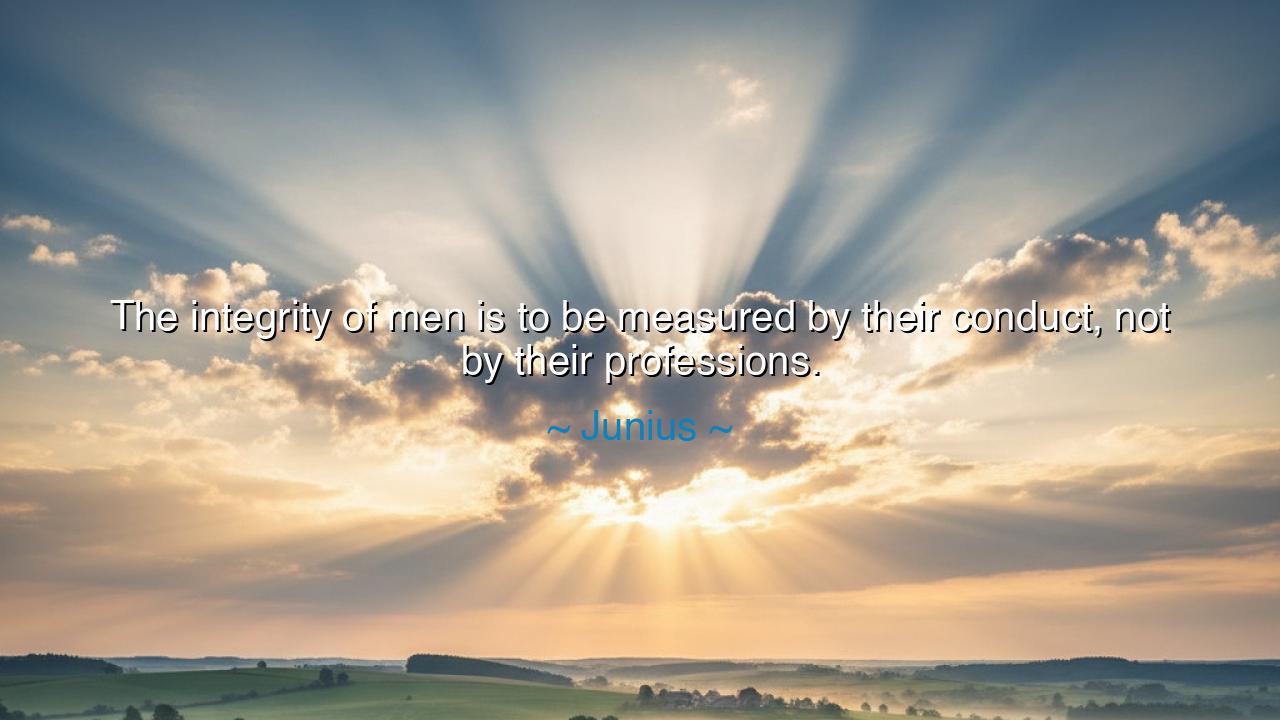
The integrity of men is to be measured by their conduct, not by






Hear now the wisdom of Junius, whose words speak to the very heart of what it means to be a man of integrity: “The integrity of men is to be measured by their conduct, not by their professions.” In this powerful statement, Junius reminds us that true character is revealed not by what one claims to be, but by the actions one takes, the choices one makes when no eyes are watching, and the consistency with which one lives their life. Professions—the words we speak, the titles we claim, the promises we make—are fleeting, but conduct, the actions we take, defines who we truly are in the eyes of the world and the eyes of the divine.
In the ancient world, the great philosophers often spoke of the relationship between words and actions. Socrates himself declared that "an unexamined life is not worth living," urging men to seek knowledge and truth. But Socrates also understood that knowledge alone was insufficient. True wisdom is shown in how one acts in the world, how one applies that wisdom to conduct. A man may speak of virtue, but his virtue is proven only when he lives it. To speak of justice is easy; to act justly, especially when tempted to stray, is the measure of a man’s character.
Consider the story of King Cyrus of Persia, a leader who is often remembered not just for the size of his empire, but for his conduct. Cyrus was hailed by his people not simply because he wore the crown of the Persian Empire, but because his actions reflected the ideals he espoused. He respected the laws of the lands he conquered, and he was known for treating both his subjects and enemies with fairness. It was not his royal profession that made him great; it was the integrity with which he governed, the consistency between his words and actions, that earned him eternal respect. The kingdom he built was not one merely of power, but of trust and justice, built upon the firm foundation of righteous conduct.
In contrast, consider the tragic example of Julius Caesar, a man whose profession as a ruler and general was filled with brilliance, yet whose actions betrayed the trust of his people. Caesar, who once promised the Roman Senate that he would preserve the Republic, ultimately undermined it through his unchecked ambition and disregard for the greater good. Though his title was grand, his conduct—marked by the corruption of power and the betrayal of his closest allies—revealed a far darker truth about his integrity. His professions as a protector of Rome were shattered by the actions he took in the pursuit of his own glory. In the end, it was his conduct, not his lofty words, that defined his legacy.
The lesson Junius imparts is one of caution and self-awareness: do not be deceived by the titles or words of others, for they are often as fleeting as the winds. True integrity is demonstrated in action, in the quiet moments when no one is watching, in the decisions we make when no reward is offered, and when the temptation to compromise is strong. It is easy to speak of righteousness, to declare ourselves virtuous, but true character is proven in the small acts of everyday life—the honesty in our dealings, the loyalty to our friends, and the compassion we show to the less fortunate.
Look to the great men and women of history who have been celebrated not for their professions, but for their unwavering conduct. Nelson Mandela, for example, is not remembered merely for the titles he held or the positions he occupied, but for his steadfast commitment to justice, equality, and reconciliation. Despite the many years he spent imprisoned, despite the hardships he endured, it was his conduct—his dedication to peace and unity—that led to the healing of a fractured nation. His integrity was not measured by the words he spoke as a politician but by the sacrifices he made and the actions he took to end apartheid.
Therefore, dear listener, let this be a guiding principle for you in your own life: do not value the words alone—for words can be empty, promises can be broken. Let your actions speak louder than any profession, for it is through our conduct that we define ourselves and build our legacy. In times of temptation or doubt, return to the truth of your conduct, for it will always reveal the depth of your character. Strive to be a person whose actions align with the integrity you claim, and you will find that your true legacy is built not on titles or professions, but on the enduring power of the choices you make.






AAdministratorAdministrator
Welcome, honored guests. Please leave a comment, we will respond soon